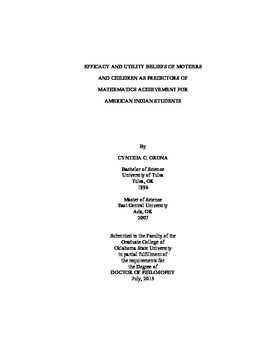| dc.contributor.advisor | Thomas, Julie | |
| dc.contributor.author | Orona, Cynthia C. | |
| dc.date.accessioned | 2014-09-24T14:17:01Z | |
| dc.date.available | 2014-09-24T14:17:01Z | |
| dc.date.issued | 2013-07 | |
| dc.identifier.uri | https://hdl.handle.net/11244/11031 | |
| dc.description.abstract | American Indians have the largest high school dropout rates of all ethnic groups in the United States. Though drop outs technically occur in high school, they actually begin with lowered academic achievement during elementary school years. Looking to mothers as the primary caretakers, this study sought to explore the correlations between American Indian mothers' and their 5th grade children's mathematics efficacy beliefs and utility values - to see if these beliefs and values could predict children's mathematics achievement. Particularly when it comes to mathematics, American Indian mothers are dually challenged to encourage their children's success in school because of (1) generalized school disconnect due to negative boarding school experiences and (2) limited understanding about how to assist children's success in mathematics as it is currently being taught. School mathematics lessons are different from those lessons mothers experienced when they were in school. New Common Core State Standards for Mathematics may contribute to mothers' disconnect. The purpose of this explanatory correlational research study was to determine the extent to which the relationship between American Indian students' and mothers' mathematical efficacy beliefs and utility values for mathematics influence student's mathematical achievement. This study, component to a larger National Science Foundation (NSF) project study (Award No. HRD-0936672), utilized data from 148 mother-child dyads. Participant children attended one of 23 rural, public schools in northeastern Oklahoma that included high American Indian student populations. The data included participants' responses to the Fennema-Sherman Mathematical Attitudes Survey (FSMAS) and children's mathematics achievement results from the Oklahoma Core Curriculum Test. Study results indicated that, although mothers mathematical efficacy belief and utility value for mathematics influenced their children's mathematical efficacy belief and utility value for mathematics, only a mother's utility value for mathematics significantly predicted children's mathematical achievement. In addition, children's own mathematical efficacy belief and utility value for mathematics was not predictive of their mathematical achievement. This research improves our understanding of the influence of parents, particularly mothers of American Indian children and can help guide supportive parent involvement in mathematics education efforts. Implications of this research relate to both theory and practice. | |
| dc.format | application/pdf | |
| dc.language | en_US | |
| dc.rights | Copyright is held by the author who has granted the Oklahoma State University Library the non-exclusive right to share this material in its institutional repository. Contact Digital Library Services at lib-dls@okstate.edu or 405-744-9161 for the permission policy on the use, reproduction or distribution of this material. | |
| dc.title | Efficacy and utility beliefs of mothers and children as predictors of mathematics achievement for American Indian students | |
| dc.contributor.committeeMember | Montgomery, Diane | |
| dc.contributor.committeeMember | Redmond-Sanogo, Adrienne | |
| dc.contributor.committeeMember | High, Karen | |
| osu.filename | Orona_okstate_0664D_12920.pdf | |
| osu.accesstype | Open Access | |
| dc.type.genre | Dissertation | |
| dc.type.material | Text | |
| thesis.degree.discipline | Professional Education Studies | |
| thesis.degree.grantor | Oklahoma State University | |
